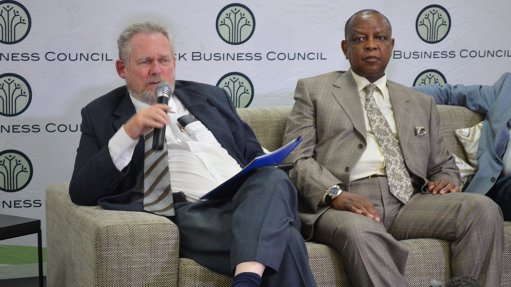
Rob Davies and Ndaba Ntsele
Photo by: dti
Government is seeking to industrialise the South African economy through the Black Industrialists Programme. This was said by the Minister of Trade and Industry, Dr Rob Davies during a round-table discussion with the Black Business Council (BBC) that was held in Johannesburg last night.
On addressing the Black Industrialists Programme in the context of the broader support that it is providing for black business in general, Minister Davies said that economic transformation depended on two inter-connected themes. These are the radical change of the productive base of the South African economy, and the challenge of changing the patterns of participation in the economy, drawing from the skills capacity and entrepreneurial spirit of the whole of the population of the country.
“This means that we have to move from being an economy that only produces and exports primary mineral commodities and an importer of finished goods. That is the least valuable place we can be in the global division of labour. The greatest part of value-chain is located in those parts of the value-chain where value is added,” said Davies.
In addition Davies said that government was seeking to try to industrialise the South African economy.
“We have been trying to change the character of Black Economic Empowerment (BEE) so that it relates to developments in the economy and we have discovered that programmes that are sector-specific work better. It is important that we develop black industrialists as an integral part of the industries. To mitigate this we have established a one-stop-shop and I can report today that the Black Industrialists Funding Forum has met on 17 March 2016, and we have received fifty applications to date with the majority coming from agro-processing, Information Communication Technology, capital equipment and construction, automotive and oil and gas sectors,” added Davies.
On addressing the issue of fronting, Davies mentioned that it was found that the majority of transactions which were passing off as BEE involved share deals in which groups of black people were given a stake in an established company.
“Very often we found that those people probably thought that they were on track to taking over leadership and management of that company but in practice they found that they were confined to some subordinate role in the company. This is a form of fraud but it was extremely difficult to prosecute. That is why we have fronting. We have reviewed this and have developed the Broad-Based Black Economic Empowerment Commission to counter this practice,” said Davies.
The President of the BBC, Mr Ndaba Ntsele expressed that there was a need for a specific voice of black business in South Africa and that the country has not yet reached a point where having this voice does not matter.
“It is therefore important for a significant organisation like ours to engage with government in order to outline our plans and express our challenges going forward. We are hoping that the Black Industrialists Programme will produce entrepreneurs that will think globally but act locally and drive our enterprises to be globally competitive,” said Ntsele.
Issued by the Department of Trade and Industry